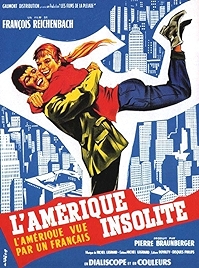In the late 1950s the French documentarian François Reichenbach took his camera to the USA for 18 months. America as Seen by a Frenchman (aka L’Amerique Insolite) is the result, a snapshot of a country caught at a moment in time, where the tension between homogenising mass consumption and the individual pursuit of happiness runs through almost every frame.
Reichenbach starts out in California and then winds his way across the country, finally ending up in New York. The opening shot is eye-catching – two American sailors staring out from a ship as it pulls into San Francisco Bay and under the Golden Gate Bridge – and Reichenbach continues to deliver seductive imagery at this level for the rest of the film.
After that arresting opening a dizzying montage – citizens in Houston dressing up as pioneers, a trip to Disneyland, a rodeo where prisoners compete at bronco-riding for the prize of a reduction in their sentence, at an ice cream parlour where no amount of whipped cream seems enough, on the beach with two models frolicking in the sea, in the photographic studio, at a strip club, a pizza joint, a turkey farm, a drive-through wedding chapel, at carnival in New Orleans, motorbike racing in the sand dunes. The scene constantly shifts, the 16mm Eastmancolor images rendering everything with a soft pastelly glow.
Reichenbach wants to capture Americans en masse, it seems, and at first it looks as if he’s come not to praise but to bury the country. But Jean Cocteau’s spoken foreword has already told us not to be too worried about this. “Reichenbach’s film,” he says, “proves that despite robotism, the tendency towards depersonalisation, the threat of the plural being victorious over the singular… everywhere you go you will find surprises, excesses, marvellous disorderliness, an instinct to disobey the rules.”
Reichenbach seems to start out with a faintly sniffy tone but he ends up entirely in love. He’s been won over. The new boy in town has been blown away by the possibilities of this vast territory. But there’s also a touch of the patrician father’s proud eye for his offspring. Look at these people, the camera seems to say, look at what they’ve achieved, how familiar and yet unfamiliar they are. And how rich they are – all that cream on the ice cream sundae.
Reichenbach notes the obsession Americans have with happiness, and how they love to replace the real (cream!) with the simulacrum (squirty cream!). And as his camera takes in one crowded event after another, beneath the surface the ongoing war between authentic folk culture and phoney mass culture is being fought, with mass culture seeming to be ahead. This worries Reichenbach – back home folk music, trad jazz and skiffle were the thing.
Michel Legrand’s score catches the tone admirably – it’s chintzy, rinky-dink, bubblegum stuff, all candycane musical stylings and deliberately pseudo-quirks. Ironic loungecore. Muzak with attitude.
There’s a focus on white people that now seems a bit disproportionate, but Reichenbach does shoot some stuff at the Mardi Gras in New Orleans, and dives into a church where Holy Rollers are at prayer. He seems to be aware that he’s not telling the whole story, or maybe he’s just admitting that he has a particular focus – a closer look at the face of America that it itself presents to the world.
By the time he’s got to New York he’s doing the equivalent of a guy on acid just saying “Wow” repeatedly. Look at those tall buildings! Look at the sky! “New York… in your reflections I discovered your treasures and your cathedrals.” Legrand’s score has become majestic, adulatory, jazz-tinged, a piano arpeggiates ever upwards. Choirs swell. America is the shop, Reichenbach concludes, with a slogan outside: “If you don’t know what you want, come in, because we have it.”
America as Seen by a Frenchman – Watch it/buy it at Amazon
I am an Amazon affiliate
© Steve Morrissey 2023


